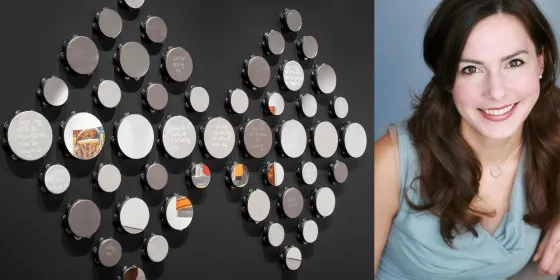The Healing Power of Music and the Arts
Music and mental health connect at The McEvoy Foundation for the Arts current exhibit, ‘Next To You’ which focuses on the healing power of the arts in a post-pandemic world. The SFCM newsroom sits down with neuroscientist and SFCM professor Dr. Indre Viskontas for her take on the exhibit and the role of music in mental health.
By Mark Taylor
Music has power. The power to connect us, heal us, and change us for the better. That’s one of the main messages from opera singer, SFCM professor, and neuroscientist Dr. Indre Viskontas. Dr. Viskontas has her Ph.D. in cognitive neuroscience from UCLA, and M.M. degree in vocal preformance from SFCM. She also recently released a book called, “How Music Can Make You Better,” and compiled a special white paper on the crucial and positive effects on children involved in music.
The ability of music and other arts to heal is also being explored at The McEvoy Foundation for the Arts, with their latest exhibit Next To You. “The pandemic caused us to feel a lot of anxiety, grief, and loss. To heal ourselves, we need to process those emotions, sit with them, and then let them go. The arts make that process not only possible, but even pleasurable,” said Dr. Viskontas.
In addition to music, the exhibit showcases dance, theater, circus arts, film, and other creative forms. Organizers wanted to create a space where people could process their emotions, “With the pandemic, we felt the loss of social spaces where people can be with others. In particular, we missed the joy, pleasure, and beauty that lives in the social spaces surrounding performing arts. With Next to You, we wanted people to experience those feelings again,” said Susan Miller, the executive director of the McEvoy Foundation for the Arts.
The positive feelings we experience from music and the arts come from our brain’s reward system, according to Dr. Viskontas. It is a complex integration of genetics, environment, and experience, but basically when our brain feels rewarded, we experience higher dopamine levels. “There are many ways that the arts can heal, but I think what the McEvoy Foundation is highlighting in this exhibit is how art can reconnect us to each other,” Dr. Viskontas continued, “When an artist shares a vulnerability, our defenses can fall away, and we can begin to shed our aggressions and reform our categorizations of ingroups and outgroups. We fear the unknown, but through the arts, we know more about the artist, their, and our culture and ourselves. That can heal divisions in society, in addition to fulfilling our own biological need to belong.”
In addition to exhibits, photography, and paintings from the McEvoy Family Collection, Next To You is accompanied in the Screening Room by Hearing Aids, another sensory experience, which explores the relationship of sight and sound in our senses, and how they work together in human communication, “We tried to build space for people to safely come back together. The arts take people out of their everyday lives and invite them to be somewhere else, pause, and process what’s going on in their lives,” Susan Miller added.
As the world returns from the lockdown to some sense of normalcy, Next To You hopes to work as a goodbye to a difficult time and help people heal using the arts.
“We look to artists to help us navigate and make sense of our emotions and our experiences,” Dr. Viskontas continued, “They can fast-track our healing, by giving us the opportunity to feel, understand and release these difficult emotions.”
You can experience Next To You, at The McEvoy Foundation for the Arts through December 4th.
Learn more about studying at SFCM.
